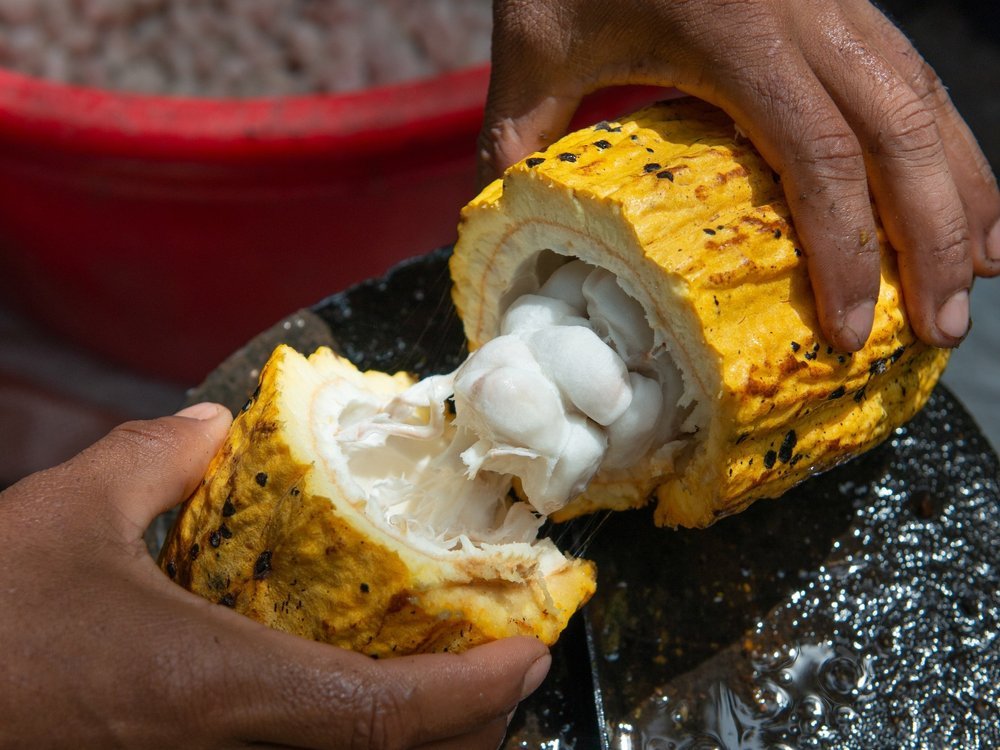As Christmas approaches, shops are lined with chocolate treats, but behind the sweet facade of brightly coloured foil lies the bitter taste of slavery and child labour. World Vision’s Advocacy Campaigns and Policy Advisor Morgan Theakston explores the dark side of a favourite holiday treat.
Around 70% of the world’s cocoa comes from West Africa, where some six million people work on cocoa farms. Tragically, nearly a third of these are children. They work grueling hours in the middle of the jungle, hacking down cocoa pods with machetes, and lugging heavy sacks long distances.
Traffickers regularly persuade children onto buses with the promise of a brighter future, only for these young boys and girls to later discover they’ve been duped. Instead of the promised bright future, they are taken to cocoa regions in nearby countries, forced into labour, and faced with physical violence if they try to escape home. To top it all off, the traffickers siphon their meagre wages.
Cocoa field owners have admitted this is slavery, but they are desperate for cheap labor to meet the soaring demand for chocolate, which has jumped by 62% over the past 15 years. Here in New Zealand, we need to understand that our demand for chocolate leads directly to a dependency on child and slave labour.
West Africa is where most of our chocolate originates, yet cocoa is not an indigenous crop. European chocolate companies introduced it in the 19th century, looking for a low-cost or free farm source of cocoa to capitalise on Europe’s growing love for the historically rare commodity. The cheaper the labour, the higher the profit margin for manufacturers.
This exploitative colonial legacy has persisted to the modern day and has resulted in a race-to-the-bottom for the mass-market chocolate industry. Many companies price-squeeze farmers on already-low rates and threaten to switch suppliers if they don’t lower their prices further.
Those who harvest the cocoa get a measly NZ$1.25 per day. Chocolate companies’ reluctance to pay more for beans keeps the market price low, incentivising farm owners to resort to child labour and modern slavery to reduce expenses and remain competitive. Children often work to increase their families’ daily income due to the low wages.

Image credits: Rodrigo Flores via Unsplash
Despite the largest chocolate companies signing the Harkin-Engel Protocol two decades ago, pledging to end child labour in the cocoa industry by 2005, the problem has only worsened. Hazardous child labour in the cocoa industry increased by 13% between 2009 and 2019. At the onset of Covid-19 in 2020, there was a further 20% increase in child labour in Cote d’Ivoire. There are a multitude of reports exposing chocolate companies for child labour in their supply chains, the most recent implicating Cadbury UK.
This is why World Vision is advocating for modern slavery due diligence legislation in Aotearoa New Zealand.
A modern slavery due diligence law in Aotearoa would mean chocolate companies are required to assess the modern slavery risks in their supply chains, including at the farm level, and take action to address cases of slavery.
The Government has made progress on this. On 28 July 2023, the Government committed to drafting a modern slavery reporting law for Aotearoa. Under the new law, any companies (including chocolate companies!) that revenue over $20 million annually will be required to be transparent and annually disclose the risks of modern slavery in their supply chains and operations.
This reporting law is important because it means that chocolate companies who may have never thought about modern slavery before will need to become educated on the issue and understand how it relates to their business. However, we know that the law also needs due diligence – the requirement to take meaningful action – to make a difference for people trapped in slavery.
Without modern slavery due diligence legislation, Kiwis cannot be confident that the chocolate they buy their kids this Christmas isn’t being harvested by children just like their own or people trapped in slavery.
A law to address modern slavery in Aotearoa New Zealand will give chocolate companies the impetus and framework to protect the workers in their supply chains. In the meantime, buying chocolate requires you to do a bit of research and prioritise finding brands that are organic and fairtrade.
It’s time for the New Zealand Government to raise the bar for all companies so that we can build a world where children are able to learn in school and fulfil their future dreams rather than toil away harvesting cocoa for our festivities.
To learn more about World Vision’s work advocating for a modern slavery law in Aotearoa, please visit: https://www.worldvision.org.nz/causes/advocacy/modern-slavery-legislation/
This article was adapted from LinkedIn article: From Bean to Bunny: Unwrapping the Dark Side of Chocolate.

